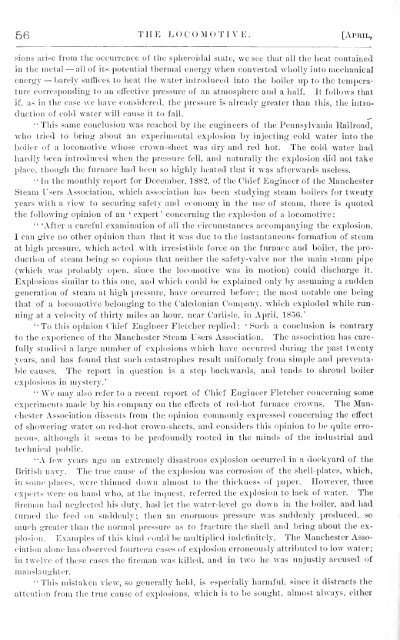The Locomotive - Lighthouse Survival Blog
The Locomotive - Lighthouse Survival Blog
The Locomotive - Lighthouse Survival Blog
Create successful ePaper yourself
Turn your PDF publications into a flip-book with our unique Google optimized e-Paper software.
56 THE LOCOMOTIVE. [April,<br />
sious arise from the occurrence of the spheroidal state, we see that all the heat contained<br />
in the metals all of its potential thermal energy when converted wholly into mechanical<br />
energy — barely suffices to heat the water introduced into the boiler up to the tempera-<br />
ture corresponding to an effective pressure of an atmosphere and a half. It follows that<br />
if, as in the case we have considered, the pressure is already greater than this, the intro-<br />
duction of cold water will cause it to fall.<br />
" This same conclusion was reached by tlie engineers of the Pennsylvania Railroad,<br />
who tried to bring about an experimental explosion by injecting cold water into the<br />
boiler of a locomotive whose crown-sheet was dry and red hot. <strong>The</strong> cold water had<br />
hardly been introduced when the pressure fell, and naturally the explosion did not take<br />
place, though the furnace had been so highly heated that it was afterwards useless.<br />
"In the monthly report for December, 1882, of tlie Chief Engineer of the Manchester<br />
Steam Users Association, which association has been studying steam boilers for twenty<br />
years with a view to securing safety and economy in the use of steam, there is quoted<br />
the following opinion of an ' expert' concerning the exjjlosion of a locomotive:<br />
" 'After a careful examination of all the circumstances accompanying the explosion,<br />
I can give no other opinion than that it was due to the instantaneous formation of steam<br />
at high pressure, which acted with irresistible force on the furnace and boiler, the pro-<br />
duction of steam being so copious that neither the safety-valve nor the main steam pipe<br />
(which was probably open, since the locomotive was in motion) could discharge it.<br />
Explosions similar to this one, and which could be explained only by assuming a Kudden<br />
generation of steam at high pressure, have occurred before; the most notable one being<br />
that of a locomotive belonging to the Caledonian Company, which exploded while run-<br />
ning at a velocity of thirty miles an hour, near Carlisle, in April, 1856.'<br />
"To this opinion Chief Engineer Fletcher replied: ' Such a conclusion is contrary<br />
to the experience of the Manchester Steam Users Association. <strong>The</strong> association has carefully<br />
studied a large number of explosions which have occurred during the past twenty<br />
years, and has found that such catastrophes result uniformly from simple and preventa-<br />
ble causes. <strong>The</strong> report in question is a step backwards, and tends to shroud boiler<br />
explosions in mystery.'<br />
" We may also refer to a recent report of Chief Engineer Fletcher concerning some<br />
experiments made by his company on the effects of red-hot furnace crowns. <strong>The</strong> Man-<br />
chester Association dissents from the opinion commonly exjjressed concerning the effect<br />
of showering water on red-hot crown-sheets, and considers this opinion to be quite erro-<br />
neous, although it seems to be profoundly rooted in the minds of the industrial and<br />
technical public.<br />
"A few years ago an extremely disastrous explosion occurred in a dockyard of the<br />
British navy. <strong>The</strong> true cause of the explosion was corrosion of the shell-plates, which,<br />
in some places, were thinned down almost to the thickness of paper. However, three<br />
experts were on hand who, at the inquest, referred the explosion to lack of water. <strong>The</strong><br />
tireman had neglected his duty, had let the water-level go down in the boiler, and had<br />
turned the feed on suddenly; then an enormous pressure was suddenly produced, so<br />
much greater than the normal pressure as to fracture the shell and bring about the ex-<br />
])losi
















